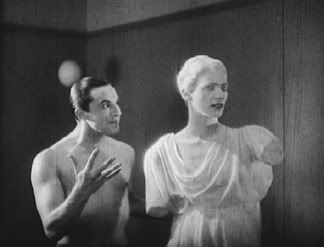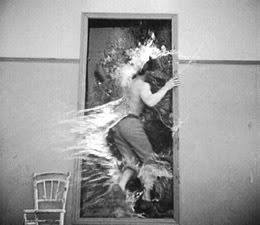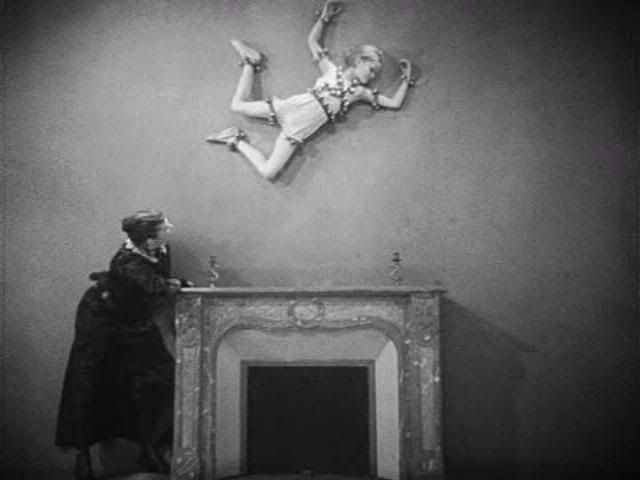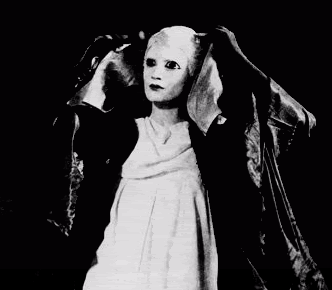or The Blood of a Poet
Cocteau: "a descent into oneself, a way of using the mechanism of the dream without sleeping, a crooked candle, often mysteriously blown out, carried about in the night of the human body."

The second of the four Cocteau films I'll be watching within the next few weeks. This film (his first) differs quite a lot from Beauty and the Beast, which was made fifteen years later. They use the same brand of magic, the trick photography and the surreal environments, but otherwise they are different creatures entirely. Beauty and the Beast is a fairy tale, a strange and possibly subversive one, but a fairy tale nonetheless. The Blood of a Poet revels in its own abstraction, in some cases seems to intentionally alienate the audience, seems anything but the film trying to speak to the child's eyes watching behind our filtering gaze.
So why have I reacted more nostalgically to this film than the fairy tale?
I recommend watching the film before reading any further.
Let me first make it absolutely clear that my childhood was long, blessed, full of fairy tales, but that I was the sort of child that saw the strangeness in things. That not only saw it, but was attracted to that strangeness.
And let's also be absolutely clear: The Blood of a Poet is a strange film. It's the sort of film that annoys most people, because the artist expects us to "interpret it for ourselves". So in the beginning, we could say the mouth coming off on the artist reflects the way a piece of art influences, or perhaps infects, its creator. We could say plenty about him making out with his own hand. We would be overwhelmed by the possibilities once he rubs it off onto a statue and gives it life. The further we make our way into the film, the less footing our explanations have. For the purposes of this write-up, I'm going to avoid explanations and focus instead on reactions. Well, one reaction. Mine.
I read (check the Senses of Cinema link below) that the film "looks more like an animated cartoon then a true live-action film", and while I wouldn't use that term exactly, it's a reasonable description. What impressed itself upon me most about the film was the sense of artificiality. We witness highly expressive and nonrealistic acting, performances that are more allegorical or metaphorical than they are representative of any true persona. Mixed in with the live action we see various paintings, sculptures (wire, stone, stone/flesh), and tableaux which correspond with the action taking place, often involving direct interaction between the two and in some instances even replacing the live action (such as the poet and his mouth-hand being shown as a statue). The settings are unfamiliar, in part because they're so sparsely decorated; there is no sense of trying to convince us of true location, we are in a false world and we know this. Most artificial of all, or most clearly artificial, are the cinematic qualities of the film. The film quality itself is fine, for the time, but the trick photography, the transitions, the use of the medium throughout the film, are all obviously filmic techniques. They don't have the invisible smoothness of special effects today, they don't engage the suspension of disbelief as urgently. Of course, that has something to do with it being a novice effort and the limitations of technology at the time, but that's not explanation enough. Cocteau seems to encourage this sense of fakeness, of something constructed. It certainly adds to the atmosphere of the piece. But it also hints at the essence of imagination, the beauty of poetic observation, and the ways they must be hindered by the failings of established artistic media.
What better way to make something seem alien than to mediate it so heavily that we know, quite consciously, that it is alien. Certainly not natural, not something that can exist outside of the cinematic realm. Film has often been described as the artistic medium that comes closest to the state of dreaming: images, best seen in the darkness, a projection of. . .

(So why did I mention my childhood before? Remember the part where the poet is stalking through the hallway of the hotel, struggling to walk against the bizarre gravity of the place. Walking through the hallway, peeking through the keyholes of DOORS. Doors. With a capital D. It was the name of a game two friends of mine created, a puzzle game that the creator narrated in person while the participant tried to figure it out. It involves a series of hallways or chambers filled with different doors, each hiding a unique and surreal scenario. The Blood of a Poet reminded me of unrestrained imagination, the kind I was free to exhibit and revel in as a child. Beauty and the Beast is nice, and creative, and beautiful, but it still adheres to a story, to characters, to expectations. Watching the poet peek into the keyholes, I am reminded of Wednesday evenings on the branches of the oak near the schoolboard office with Andrew, trying to figure out what to do with the purple lightbulb or that gargoyle. It doesn't seem like a dream to me so much as an adventure one might stumble into, lucid and awake. I can see the Mexican die and fall and rise and fall again and it will not seem strange, because there are worlds where this happens. The poet observes, and poetic observation is often like a dream. The film seems less like a dream to me and more like the waking life of the poet, however dreamlike that might be.)

Should be clear by now, but my favorite part of the film was the sequence within the mirror. Well, I've always liked mirrors, and doors, and that part stood out to me for its own merits and the personal merits it reminded me of. There is the snowball fight, of course, and the card game that follows. These also deal with the essence of the poet, although these deal less with perception and more with the nature of the artist and his struggle. Cocteau, temporarily disengaging his open interpretation, suggested that:
"The poet's solitude is so great, he so lives what he creates, that the mouth of one of his creations lives in his hand like a wound, and that he loves this mouth, that he loves himself in short, that he wakes up in the morning with this mouth against him like a pickup, that he tries to get rid of it on a dead statue-and that this statue begins to live-and that it takes its revenge, and that it sets him off upon awful adventures. I can tell you that the snowball fight is the poet's childhood, and that when he plays the game of cards with his Glory, with his Destiny, he cheats by taking from his childhood that which he should draw from within himself."
Maybe I'm wrong to think of my childhood, then. But I wouldn't call this drawing from my childhood. I'd call it recognizing a common strand of conscious perception running between my childhood, myself, and the ideas that Cocteau suggests in this film. If The Blood of a Poet was meant to portray the struggle of the artist, it didn't work its wonders on me. It achieved something else, which I would consider more admirable.
Either way, it makes me want to play Doors.
(Regarding the links below, I have the regular imdb, the Criterion page (check out the essay, by Cocteau), the Senses of Cinema article, and another blog called the Criterion Contraption; the latter features what basically function as reviews, but I'll give him credit, because it has some interesting stuff and he's more open-minded than most)

Links:
Imdb entry
Criterion page
Senses of Cinema
Criterion Contraption
No comments:
Post a Comment